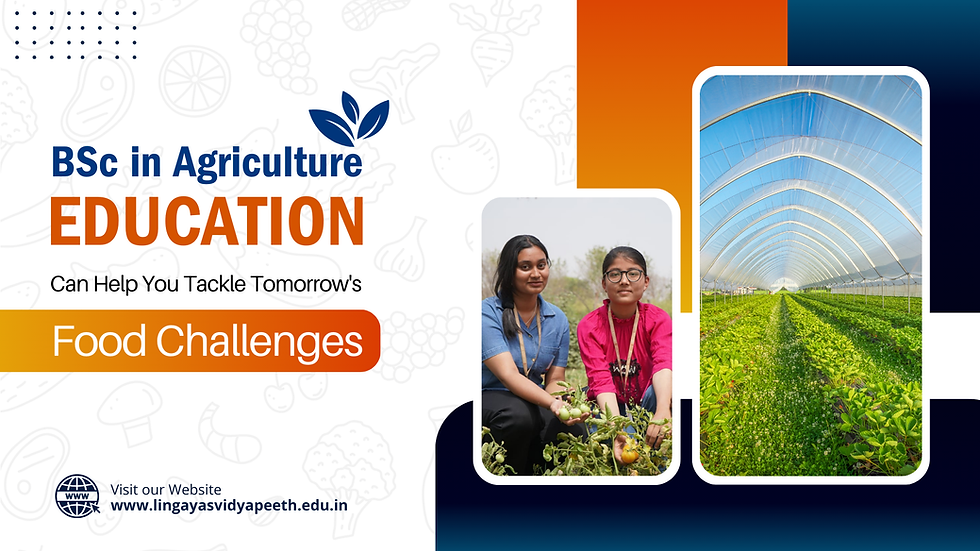How a BSc in Agriculture Can Help You Tackle Tomorrow's Food Challenges?
- lingayasvidyapeeth60
- Jun 27, 2024
- 3 min read

Our food system faces a complex web of challenges. A growing population both in India and globally, climate change, and resource scarcity all threaten our ability to produce enough healthy food for everyone. But no worries, aspiring changemaker! A BSc in Agriculture equips you with the knowledge and skills to become a part of the solution.
So, let's delve into the biggest challenges agriculture faces and how a BSc degree empowers you to address them:
Challenge #1: Feeding a Growing Population
The world population is anticipated to exceed ten billion by 2050. That's a lot of mouths to feed! We need to increase food production by 70% to meet this demand.
How a BSc in Agriculture Helps:
Boosting Yields: You'll learn about sustainable farming practices, crop rotation techniques, and the use of improved seeds to increase food production without harming the environment.
Precision Agriculture: You'll discover how precision technology like drones and data analytics can optimize resource use and maximize yields.
Alternative Food Sources: You'll explore the potential of vertical farming, hydroponics, and even insect protein production as innovative solutions to feed the future.
Challenge #2: Climate Change and its Impact
Erratic weather patterns, rising temperatures, and water scarcity are major threats to agricultural productivity.
How a BSc in Agriculture Helps:
Climate-Smart Agriculture: You'll learn about practices like water conservation techniques, drought-resistant crops, and soil management to build resilience against climate change. (Effective Tips for Farming in Changing Climates)
Renewable Energy Integration: You'll explore how to integrate renewable energy sources like solar power into farm operations, reducing reliance on fossil fuels.
Carbon Sequestration: You'll understand how sustainable farming practices can actually help mitigate climate change by capturing carbon in the soil.
Challenge #3: Resource Scarcity and Sustainability
Water availability for agriculture is a growing concern, and soil health is declining due to overuse and improper management.
How a BSc in Agriculture Helps:
Sustainable Land Management: You'll learn about soil conservation techniques, nutrient management practices, and integrated pest management to protect our precious resources.
Water Conservation: You'll explore irrigation technologies and water-efficient farming practices to optimize water use on farms.
Precision Agriculture: Again, technology comes to the rescue! You'll learn how data analysis can help farmers use resources more efficiently, minimizing waste and environmental impact.
Opportunities from BSc in Agriculture Education
A BSc in Agriculture isn't just about solving problems; it's about creating a better future for our food system. You could:
Become an Agricultural Extension Officer: Educate farmers about new technologies and sustainable practices.
Work in Agribusiness: Contribute to the development, marketing, and distribution of agricultural products.
Pursue Research: Help develop new crop varieties, improve farming techniques, and address emerging challenges.
Start Your Own Sustainable Farm: Be a role model for environmentally conscious food production. (Sustainable Farming Practices for a Greener Tomorrow)
In conclusion, A BSc in Agriculture is a dynamic foundation for a fulfilling career. This program is more than just a degree; it's a passport to a fulfilling career that makes a real difference. So, if you're passionate about food, the environment, and innovation, this path might be perfect for you!
If you want to pursue a BSc degree in Agriculture from one of the best agriculture colleges in Delhi NCR, then you should choose Lingaya’s Vidyapeeth. Employing a comprehensive approach that blends academia, practical experience, and industry relevance, graduates evolve as confident, skilled, and compassionate professionals able to face the problems and possibilities of the agricultural sector.







Comments